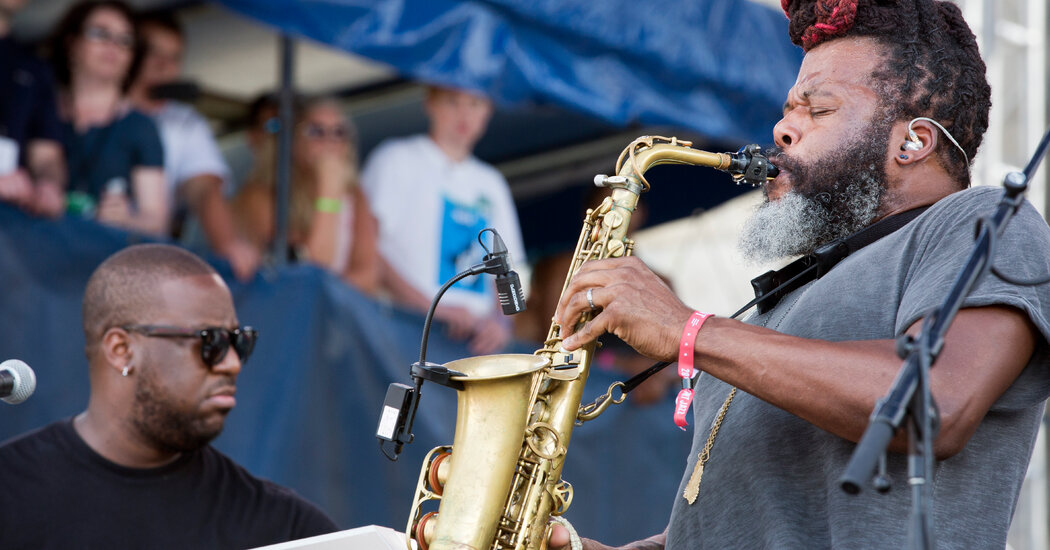Casey Benjamin, who brought colorfully expansive saxophone flourishes to the Grammy-winning Robert Glasper Experiment and added rich layers of texture to recordings by Solange, A Tribe Called Quest and many others, died on March 30 in Maryland. He was 45.
The cause was pulmonary thromboembolism, his brother, Kevin Benjamin, said. He did not say where in Maryland Mr. Benjamin died.
Known for his willingness to experiment, his exuberant stage persona and his trademark swirl of locs, often streaked with teal or red, Mr. Benjamin was a founding member of the pianist Robert Glasper’s combo, which, the critic Nate Chinen wrote in The New York Times in 2012, “specializes in deep, immersive grooves, nourished as much by hip-hop and R&B as any known species of jazz.”
“Black Radio,” the band’s fourth album on the venerable Blue Note label, featured guest appearances by the neo-soul singer Erykah Badu, the rappers Lupe Fiasco and Yasiin Bey (formerly Mos Def) and others. It won the 2012 Grammy Award for best R&B album and rose to No. 15 on the Billboard album chart. Mr. Benjamin shared another Grammy with the band in 2015 when “Jesus Children,” a Stevie Wonder cover, won for best traditional R&B performance.
Whether collaborating with Mr. Glasper or the critically acclaimed vibraphonist Stefon Harris in the band Blackout, Mr. Benjamin showed off his distinctive voice on his primary instrument, alto saxophone. In an obituary, the jazz bible DownBeat wrote that he “possessed a fluid, round sound on the alto saxophone and a unique sense of phrasing.”
But he never let himself be limited by genre, style or even instrument; he created a rainbow of sounds using not only reeds and woodwinds but also a vocal synthesizer manipulated with a keytar (a keyboard instrument worn with a strap around the neck), along with other synthesizers and effects pedals.
“Everything is basically about textures,” he said in a 2012 video interview. “My love for synths, I try to translate it into everything I’m doing. Even with a woodwind instrument, I try to emulate a Moog, or some sort of keyboard or analog synthesizer.”
As Derrick Hodge, the bassist and composer who worked with Mr. Benjamin in both the Experiment and Blackout, put it in an interview, “Before Casey would ever play a note, you would see him, and something about his energy just exuded freedom — ‘Hey, let’s get into something that just speaks to us, that feels real.’”
Mr. Benjamin’s many collaborations included appearances on “We Got It From Here … Thank You 4 Your Service,” the 2016 comeback album by A Tribe Called Quest, and on Solange’s chart-topping album “A Seat at the Table” that same year.
Along with Mr. Glasper, Mr. Hodge and many others, Mr. Benjamin played on “Love Will Find a Way” (2019), the first solo album in nearly two decades by the Earth, Wind & Fire vocalist Philip Bailey.
Earlier that decade he had toured with Patrick Stump, the lead singer of the band Fall Out Boy, in support of his 2011 solo album, “Soul Punk.” During a recent Fall Out Boy concert in Milwaukee, Mr. Stump paused to pay an emotional tribute to Mr. Benjamin:
“I don’t say this lightly. He was probably the most talented musician I’ve ever met anywhere.”
Even when playing in support of other artists, Mr. Benjamin viewed himself less as a sideman than as a fellow musical voyager.
“Ninety-nine percent of my career I’ve been hired to be myself,” he said in a 2018 interview with the website HighBreedMusic. “‘I want Casey Benjamin; just let him do what he does.’ Because I’ve created this lane for myself, I created this sort of thing that only I can do.”
Casey Bryon Benjamin was born on Oct. 10, 1978, in Brooklyn, the youngest of three children of Gentle Benjamin, a television video producer from Grenada, and Julieta (McAlmon) Benjamin, a nurse assistant from Panama.
Casey was already showing an interest in jazz by the time he was 4, and by 8 he was learning to play piano, with saxophone soon to follow. Growing up in South Jamaica, Queens, he was also surrounded by the sounds of the Caribbean that were percolating in his neighborhood. “With Caribbean and Latin culture, the party aspect is always deeply ingrained in the music,” he told HighBreedMusic.
After graduating from the Fiorello H. LaGuardia High School of Music & Art and Performing Arts in Manhattan in 1996, he studied music at the New School for Social Research in Greenwich Village, where he met Mr. Glasper, setting in motion collaborations that would help define his career.
In recent years, he toured with his own band, with a solo album scheduled to be released later this year.
In addition to his parents and his brother, Mr. Benjamin is survived by his sisters, Nicole Benjamin and Cristina King, and his partner, Whitley Davis.
Addressing the audience at the recent Fall Out Boy concert, Mr. Stump recalled his taciturn stage persona in the band’s early years, and said that Mr. Benjamin had helped change that. “His authority for joy was pervasive,” he said. “And to be in his presence was to understand that music is supposed to be joy. We’re supposed to share this together.”
Putting it more simply, Mr. Stump said, “He taught me to smile onstage.”


